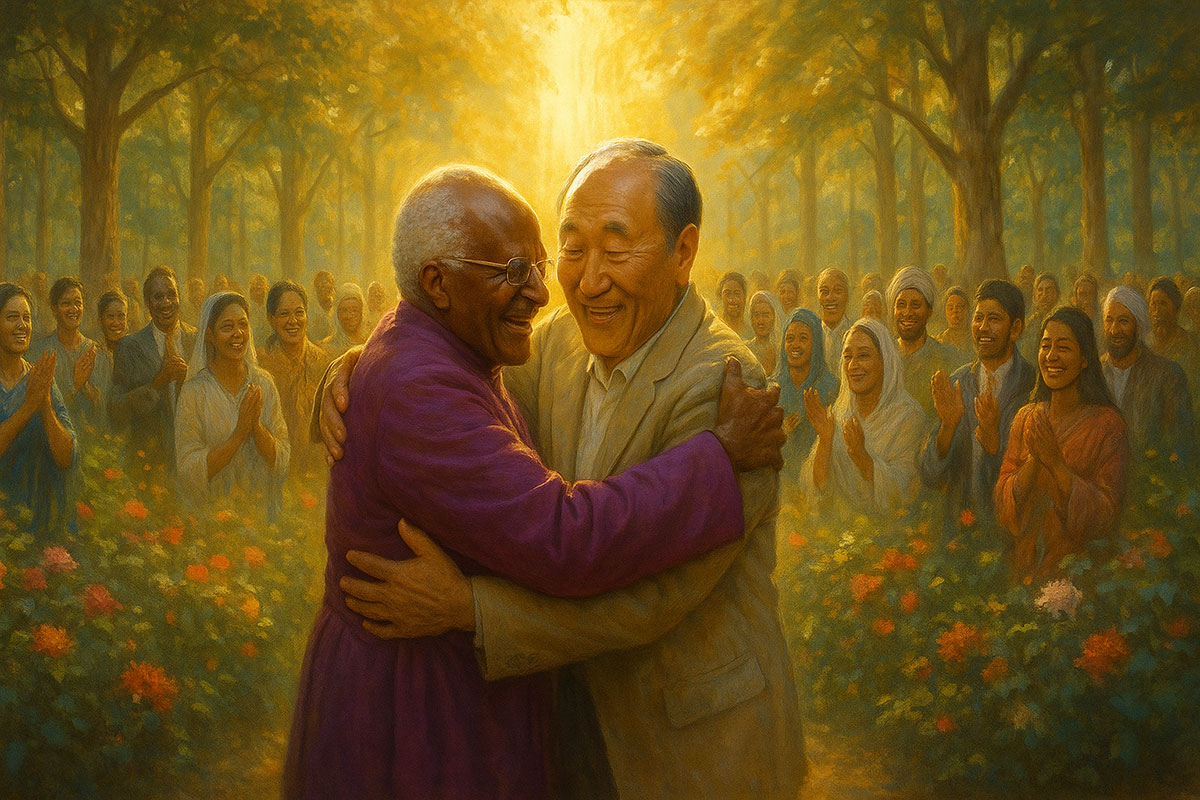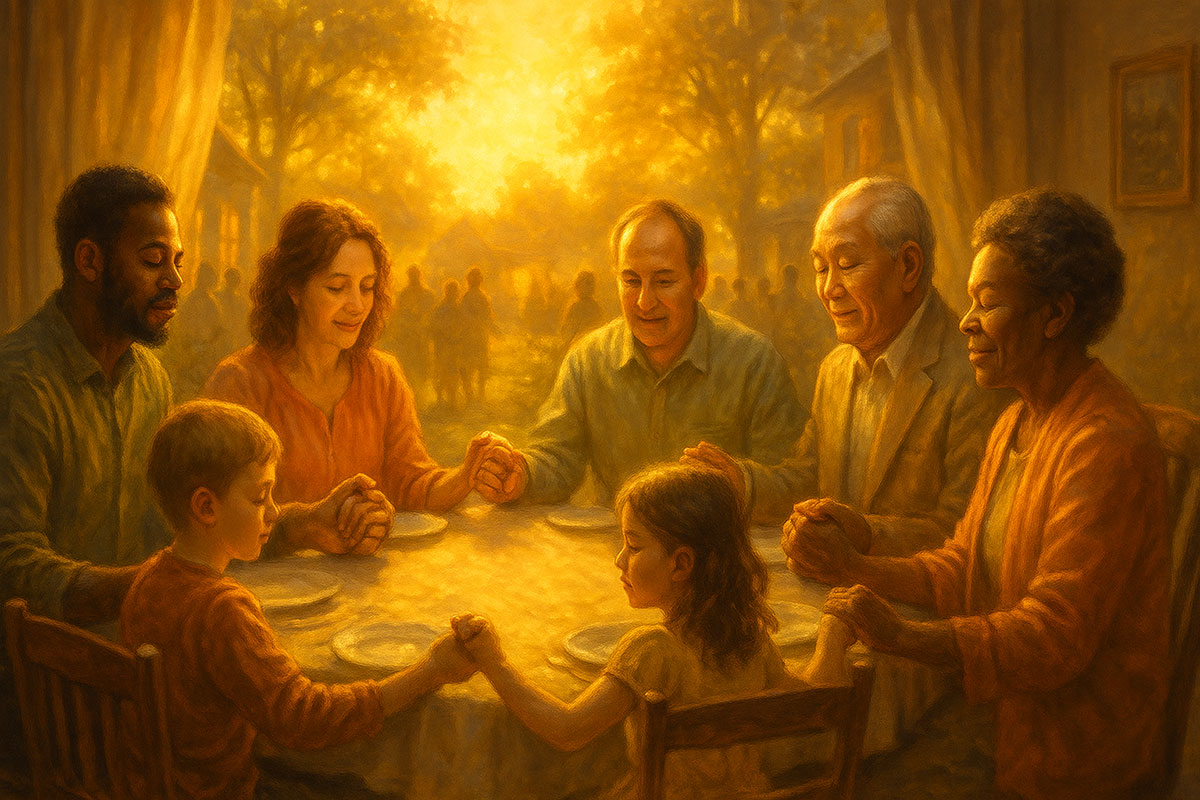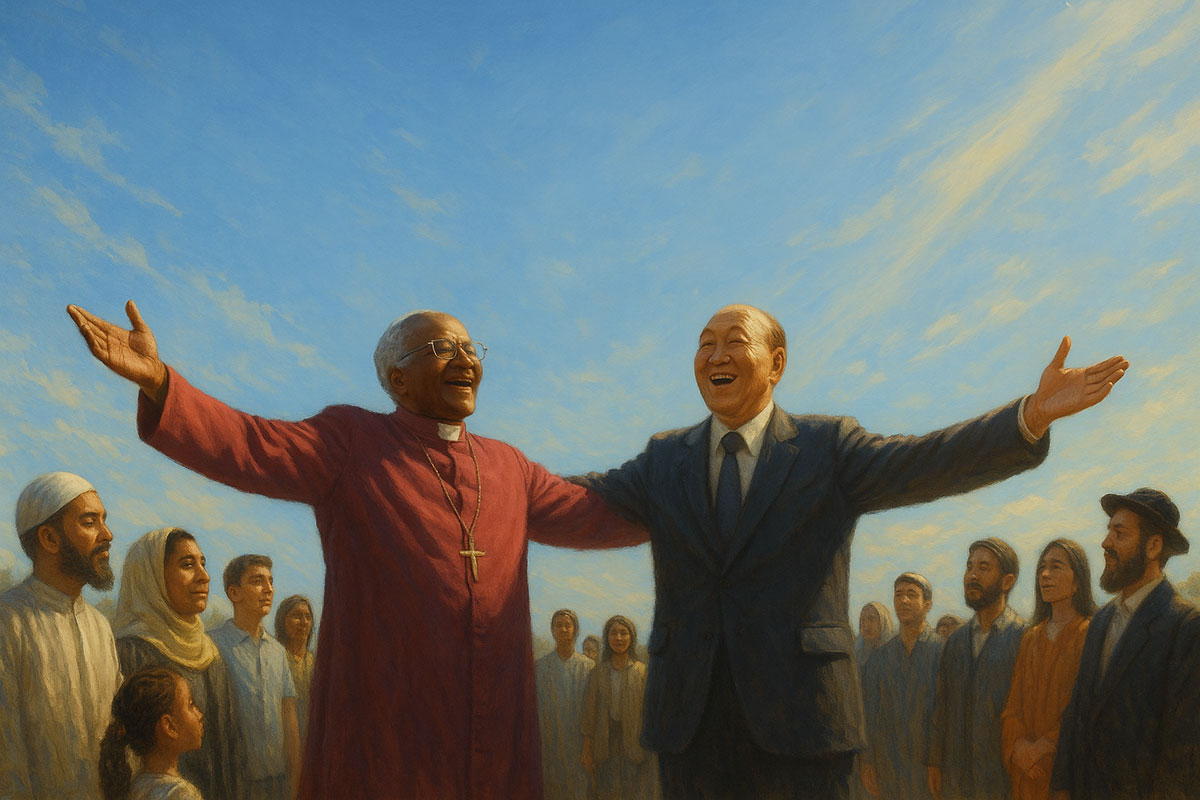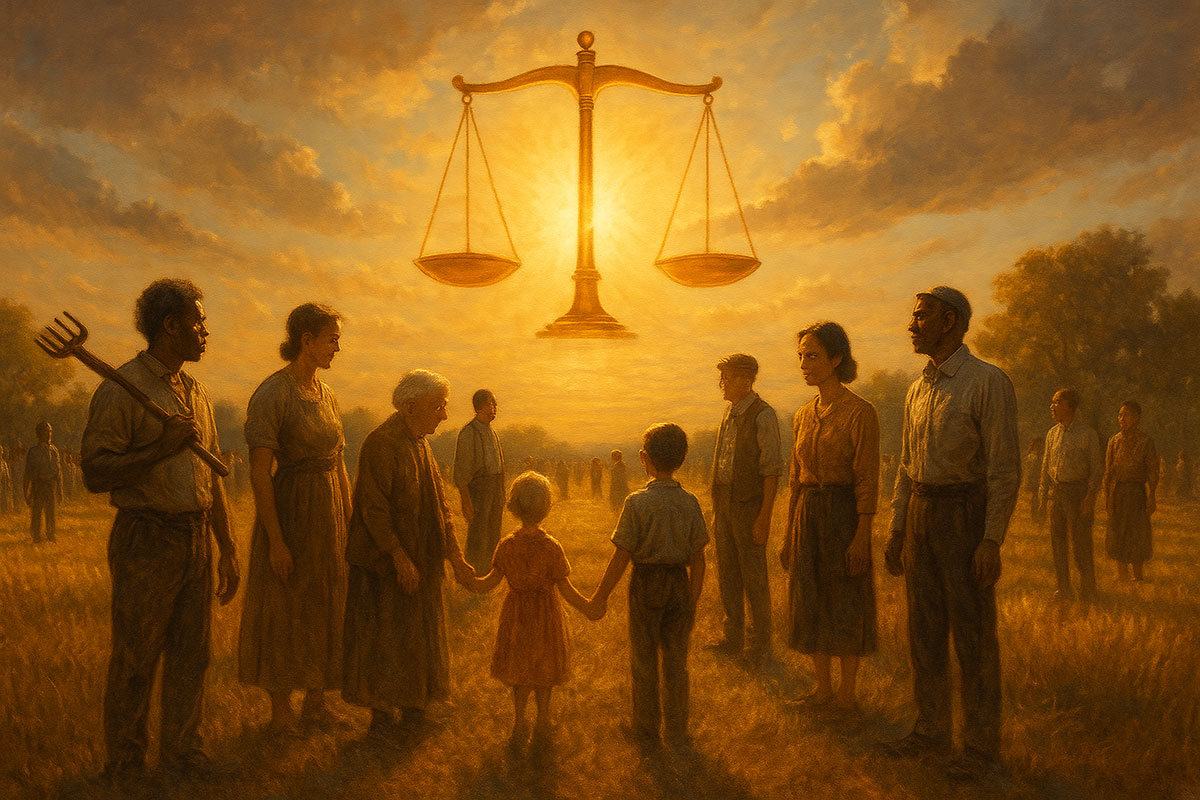
|
Getting your Trinity Audio player ready...
|

Introduction by Desmond Tutu
My dear friends, welcome. Today we gather not in the name of one nation, one religion, or one race, but as children of the same Heavenly Father. Our world in 2025 is torn by division, fear, and inequality — but it is also alive with the possibility of love, reconciliation, and peace.
I am joined by my brother, Rev. Sun Myung Moon, a man who has borne the pain of division in his own homeland, and yet never stopped dreaming of unity. Together, we will speak from our hearts about what humanity most needs to hear in this time: how to heal wounds, how to cherish family, how to see God not as the possession of one religion but as the Parent of us all, how to pursue justice that honors dignity, and how to live with unshakable hope.
We are not experts with charts and statistics — we are two old friends meeting at last, sharing laughter and tears. And if you listen not only to our words but to the love behind them, perhaps you will hear the voice of our Heavenly Father calling all of us home to one family.
(Note: This is an imaginary conversation, a creative exploration of an idea, and not a real speech or event)
Topic 1: Healing the Wounds of Division

[The setting is timeless — a sunlit garden filled with the fragrance of lilies. Two figures approach one another, and before words are spoken, their eyes meet with the warmth of recognition. They laugh as if they’ve known each other forever.]
Desmond Tutu (laughing, arms wide): Ah, my brother! How strange that we never met before. And yet, I feel as though I’ve known you all my life.
Rev. Sun Myung Moon (smiling deeply): Yes, like two children who grew up under the same Heavenly Father’s roof but in different rooms, and now we finally meet in the garden.
Tutu: Exactly! You know, most people when they pray, they say “Lord Jesus Christ” or “Almighty God.” But you too called Him Heavenly Father. When I heard that, I thought, “Ah, here is a man who knows the same intimacy I have tasted.”
Moon: How could we call Him anything else? A Lord may command, a King may rule, but only a Parent loves with tears, suffers with us, and rejoices when we grow. I have always felt God’s heart is not distant, but aching, like a Father whose children are estranged.
Tutu (nodding): Yes, yes! That’s it. You see, in South Africa, under apartheid, they tried to divide us by color, tribe, status. But I could not hate, because I knew the one who created us is our Heavenly Parent. And when you see the world that way, every enemy becomes a brother you must bring home.
Moon: This is why reconciliation is not optional. It is the very essence of God’s plan. When I saw the division of Korea — one family split into North and South — I knew this was humanity’s greatest sin repeated: Cain and Abel, brothers turned against each other. The wound of division is always in the family first.
Tutu: And healing begins the same way, doesn’t it? Not with politics alone, but with forgiveness. Forgiveness is costly, my brother, but oh, how it frees the soul! Without it, justice becomes revenge. With it, justice becomes restoration.
Moon (eyes glistening): Forgiveness is the seed of peace, but love is its fruit. A family reconciles not by remembering wrongs, but by rediscovering love. The same is true for nations, for races, for religions.
Tutu (with gentle joy): And isn’t it wonderful that God uses broken people like us to say these things? We are both proof that laughter and tears together can heal divisions more deeply than fear or anger ever could.
Moon: Yes. We laugh because we know the ending — that one day humanity will live as one family under God. Until then, we must wipe away tears and embrace even those who persecute us.
Topic 2: Family as the Foundation of Peace

[The two men stroll together along a shaded path, the sunlight falling gently through the trees. Their laughter subsides into a deeper rhythm, like the cadence of prayer shared between friends.]
Moon (softly): My brother, when I look at the world’s pain, I see that it always begins in the smallest unit — the family. If love is broken at home, nations cannot stand. When parents and children are estranged, the entire world trembles.
Tutu (nodding): Oh, yes, yes! You know, I’ve always said that the home is the first church, the first school, the first place of justice. You cannot speak of loving the stranger if you cannot love your own child. And you cannot preach forgiveness if you will not forgive your own father or mother.
Moon: Exactly. I have taught that the family is the school of love. First we learn the love of children for parents, then the love between brothers and sisters, then the love of husband and wife, and finally the love of parents for their children. Each expands outward, like ripples on a pond, until it becomes love for humanity and love for God.
Tutu (smiling warmly): You put it beautifully. And isn’t it remarkable that in every culture, every tribe, every nation, family is at the center of meaning? Even when broken, people yearn for it. You see, ubuntu — I am because we are — begins not with the nation, but with the family table.
Moon: Yes. A child who has never tasted love at home will struggle to trust others. A couple that cannot respect one another will raise children who inherit bitterness. But when love flows at home, it is like a seed planted in God’s garden. It grows into peace that no dictator, no ideology, can uproot.
Tutu (thoughtful): Yet today, families are so fragile. Divorce, abuse, neglect, loneliness… They wound the human soul more deeply than war sometimes. And what do we offer the young? A culture that celebrates self, but forgets sacrifice.
Moon: That is why marriage must be sacred, not just a contract. I always taught that man and woman together complete the image of God. Without the unity of husband and wife, God’s heart cannot fully dwell on earth.
Tutu (eyes twinkling): You know, my friend, I often teased young couples in South Africa: “Marriage is a promise to forgive — before you even know what you’ll forgive for!” (laughs) But beneath the joke is truth. The covenant of love is what steadies the whole ship of society.
Moon (laughing deeply): Yes, yes! And children are the sailors! (he gestures playfully) But the family is not only for itself. God’s dream is that each family becomes a lighthouse, shining love into the community. Imagine if every family treated neighbors as extended relatives, every elder as a grandparent, every child as our own! The world would change overnight.
Tutu (growing tender): And think of the orphans, the refugees, the lonely — how much they ache for a family’s embrace. If we who claim faith cannot provide that, what kind of faith do we have? The Gospel says, “God sets the lonely in families.” That is our task, to make families wide enough to hold the rejected.
Moon: Amen. Family is not a cage of bloodlines; it is the doorway to God’s universal family. In 2025, humanity must learn that race, nation, and religion are not barriers but branches of the same family tree.
Tutu (grinning, voice rising with conviction): Preach it, brother! If we are all children of the same Heavenly Father, then every child has the right to be cherished, every parent the duty to nurture, every community the joy of protecting its weakest.
Moon (placing his hand on Tutu’s arm): That is the peace we seek, my friend. Not peace written on treaties alone, but peace born in kitchens, in cradles, in wedding vows, in whispered prayers at bedtime. True peace is always a family affair.
Topic 3: Faith and the Universal God of Love

[The two men pause beneath a tall oak tree. The afternoon sun pours over the fields, golden but not yet fading. A breeze carries the sound of distant birdsong. The openness of the sky seems to invite them into a larger conversation.]
Tutu (looking upward, squinting in the sunlight): Isn’t it marvelous, my brother, how the heavens declare God’s glory without a single word? This sky — no walls, no borders. Just vastness. It tells me: our God cannot be small.
Moon (smiling, nodding): Yes. The sunlight covers everyone without discrimination. It shines on believers and unbelievers, rich and poor, righteous and sinner. That is the Heavenly Parent’s heart — no favoritism, only love.
Tutu: You know, I’ve often said, “God is not a Christian.” People used to gasp when I said that. (laughs) But what I meant was simply this — God cannot be the property of one religion, or one denomination.
Moon: I said something very similar. That when we go to the spirit world, no one will ask if we were Catholic, Protestant, Buddhist, or Muslim. They will ask only: Did you love? Did you live as a child of God?
Tutu (leaning forward, eyes shining): Ah, yes! And yet, how we’ve fought over whose doctrine is purest, whose rituals are correct. We built walls where God wanted bridges.
Moon (with quiet intensity): Religion has committed great sin in that way. By claiming exclusivity, it has broken God’s heart. A parent cannot rejoice if even one child is shut out.
Tutu (softly): And we’ve shut many out, haven’t we? We forgot the poor, the marginalized, the ones who don’t fit into tidy categories. And yet they, too, are God’s beloved.
Moon: This is why I always called Him Heavenly Father. Not Lord alone, not Judge alone, not even Savior alone. A true Father. And a Father longs to embrace all children.
Tutu (laughing warmly): I feel such kinship with you, brother! Because when you pray to Heavenly Father, you remind people of what is most important — that love comes before law, before creed.
Moon (his voice deep with conviction): In 2025, this must be our message: religions must repent of arrogance and competition. Instead of asking, Who is right? we must ask, How can we reveal God’s love together? Humanity is starving for this.
Tutu: Indeed. If we truly believed in the God of all, we would tremble to harm another human being. Because in harming another, we wound our Father’s heart.
Moon (nodding): When one child suffers, the Parent suffers. When nations are divided, God is crucified again. But when brothers reconcile, when faiths embrace, God’s joy overflows.
Tutu (looking out over the open sky): Yes… The whole of creation longs for us to wake up to this truth. And perhaps that’s why we are here, you and I — to remind people that the sky is wide enough for everyone, and God’s love is wider still.
Moon (with a gentle smile): The sky itself is God’s sermon. And our duty is simply to echo it — that all are children of one Heavenly Parent.
[The breeze grows stronger, rustling the leaves above them. The afternoon light bathes them both in brightness, as if affirming the words just spoken.]
Topic 4: Justice, Economy, and the Dignity of All

[The two men walk slowly toward a small pond. The afternoon sun dips lower, casting long shadows across the grass. The light is warmer now, tinged with orange, as if the earth itself leans into reflection.]
Tutu (sighing deeply): My friend, we cannot talk about God’s love without talking about justice. Too many of God’s children go to bed hungry tonight, while others gorge themselves. Too many live under oppression while others live in comfort.
Moon (nodding gravely): Yes. Poverty is not only an economic problem; it is a spiritual wound. When one child of God is degraded, the dignity of the whole family is diminished.
Tutu: In South Africa, we saw how racism and greed combined to strip people not only of their land but of their sense of worth. To heal such wounds, we needed not just policy changes, but a moral awakening.
Moon: It is the same everywhere. I saw in Korea how ideologies divide — communism and capitalism both forgetting the human being at the center. Systems without God become cruel machines.
Tutu (raising a hand, voice firm): Exactly! We must insist that every economy, every government, be measured not by its wealth or its weapons, but by how it treats its weakest members. Jesus said, “As you did it to the least of these, you did it to me.”
Moon (with passion): And I taught that true prosperity comes only when it is shared. Wealth hoarded is a curse; wealth offered is a blessing. We must build a heavenly economy, where innovation serves compassion, and success is measured in love.
Tutu (smiling gently): You sound like a prophet of ubuntu. “I am because we are.” A person is not truly rich until the community thrives.
Moon: Yes. And in this age, greed has become a global idol. Corporations control governments, technology grows without ethics, and people are treated as consumers, not children of God. This is why voices must rise to remind humanity: dignity first.
Tutu (with sorrow): And yet, my brother, those voices are often silenced. When we speak of justice, we are called dreamers, even troublemakers. You endured prison, persecution. I faced death threats. And still we spoke.
Moon (his face solemn, but resolute): Because silence would betray our Father. A parent cannot watch silently while one child strikes another. Justice is love in action. Sometimes it must be firm, even costly.
Tutu (nodding): Forgiveness does not mean excusing injustice. It means holding oppressors accountable, but without losing sight of their humanity. That balance — oh, it is difficult! But necessary.
Moon: Yes. We do not seek revenge, but restoration. We want not only to free the oppressed, but to free the oppressor from the chains of hatred and greed. That is true liberation.
Tutu (with a hopeful glimmer): Imagine, if in 2025, we could shift even a fraction of the world’s military budgets into schools, hospitals, and homes. Imagine what music, laughter, and joy would rise!
Moon (his voice firm, eyes alight): That is God’s economy. A world where resources are used not for destruction but for creation. Where every child eats, every family has a home, and no one is discarded. That is the kingdom of heaven on earth.
[They pause in silence, the pond before them reflecting the glowing sky. The stillness feels heavy yet holy, as though the earth itself waits for this vision to be fulfilled.]
Topic 5: Hope for Humanity’s Future

[The two men sit quietly as the sun sinks behind the horizon. The sky explodes in colors — orange, crimson, violet — before slowly giving way to deep indigo. One by one, stars appear, scattered like promises across the night. The pond before them reflects both the fading fire of sunset and the newborn brilliance of starlight.]
Tutu (whispering with awe): Look, my brother. The day is ending, yet the darkness is not empty — it is filled with stars. Hope is like this, isn’t it? Even when the sun of certainty sets, the heavens scatter light enough for us to walk on.
Moon (eyes lifted): Yes. Humanity often thinks hope is naïve, but it is the greatest act of defiance. To hope is to believe the Heavenly Parent’s dream has not failed. That we are still moving toward the day when all people live as one family under God.
Tutu (smiling): You sound like the prophets. And I suppose that is what we are, in our stumbling ways — dreamers who refuse despair. You know, despair is the real enemy. It whispers: “Nothing will change.” But hope, ah, hope shouts: “Watch what God can do!”
Moon: Yes. Despair paralyzes; hope gives wings. When I looked at the division of Korea, when I faced prison, when I was rejected and mocked, I held hope — not for myself, but for God’s children.
Tutu (leaning forward, voice tender): And I too, during apartheid, when hatred was everywhere, I clung to hope. Sometimes it was all we had left. But hope is contagious. A single candle in the dark can ignite a thousand more.
Moon: Hope is not just comfort. It is responsibility. To hope means to act — to build families of peace, to bridge nations, to reconcile religions. Hope must have hands and feet.
Tutu (laughing gently): And a heart that laughs! (grins) Because hope without joy is too heavy to carry. We must laugh, even in the struggle, to remind ourselves that victory belongs to love, not to fear.
Moon (his face radiant, reflecting the starlight): The young people must hear this most. In 2025, they are tempted by cynicism. They see war, inequality, climate crisis, and think, “It is too late.” But no — it is never too late. God is not finished with humanity.
Tutu (raising his hand to the stars): Exactly! The youth are not inheriting a graveyard. They are inheriting a garden — though it needs much tending. And we must tell them: do not be afraid. Your small acts of love will ripple across generations.
Moon (his voice deep and steady): And when they love, they bring joy not only to one another, but to Heaven itself. Each reconciled heart, each healed family, each just act — it makes God smile.
Tutu (gazing at him, eyes bright with tears): My dear brother, perhaps that is the truest hope of all — that in the end, after all our struggles, God will smile.
Moon (placing a hand over Tutu’s): Yes. And in that smile, all divisions, all pain, all despair will vanish. Humanity’s long night will give way to dawn.
[They fall silent, watching the stars bloom brighter overhead. Two old friends, reunited beyond time, resting in the certainty that hope — God’s eternal hope — is stronger than despair. The night embraces them, not with darkness, but with infinite light.]
Final Thoughts by Desmond Tutu

My beloved friends, as our conversation draws to a close, let me say this plainly: the future is not written in despair, but in hope. The divisions of our world are not stronger than the love of our Heavenly Father. The greed and injustice we see are not greater than the courage of those who believe in dignity for all.
If you forget everything else, remember this: You are God’s child. And so is your neighbor. And so is your enemy. Treat them as family. Heal, forgive, embrace.
Rev. Moon and I, though we walked different paths, discovered that our hearts beat with the same truth — that joy, reconciliation, and love are the greatest forces in the universe. And so, let us leave here not with heavy hearts but with laughter on our lips, courage in our spirits, and hope shining brighter than the stars.
For the world is waiting, and God is watching. And together, as one human family under Heaven, we can make Him smile.
Short Bios:
Desmond Tutu
Archbishop Desmond Tutu (1931–2021) was a South African Anglican cleric, theologian, and human rights activist. A leading voice against apartheid, he chaired the Truth and Reconciliation Commission and became a global symbol of forgiveness, justice, and reconciliation. Known for his infectious laughter, deep spirituality, and belief in ubuntu (“I am because we are”), he received the Nobel Peace Prize in 1984 for his tireless fight for racial equality and human dignity.
Rev. Sun Myung Moon
Rev. Sun Myung Moon (1920–2012) was a Korean religious leader, founder of the Unification Movement, and advocate for world peace and family values. Surviving imprisonment and persecution in both Korea and the U.S., he taught that God is the Heavenly Parent of all humankind and emphasized the family as the cornerstone of peace. His mission extended to interfaith dialogue, reconciliation between enemies, and the vision of “One Family Under God,” inspiring movements for global unity and moral renewal.

Leave a Reply